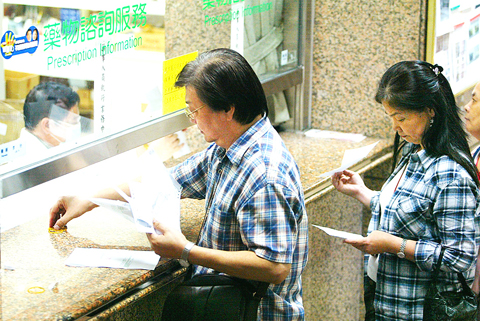The Bureau of National Health Insurance (BNHI) yesterday announced a new policy to extend the insurance plan’s coverage of medicines for patients suffering from hepatitis B and hepatitis C.
For hepatitis B patients, the period for which their medicines are covered by National Health Insurance will be extended from 18 months to 36 months. For hepatitis C patients, their free medicine period will be extended from six months to 14 months. The new policy will become effective from Sunday.
BNHI claims review and drug benefit unit manager Shih Ru-liang (施如亮) said that approximately 10,000 hepatitis B patients and another 5,000 hepatitis C patients will benefit from the new policy.

PHOTO: CNA
She said that a hepatitis B patient is estimated to be able to save NT$50,000 (US$1,540) a year on drug expenses.
Hepatitis C patients will be able to save approximately NT$140,000 a year.
Shih said that the budget for the new policy came from the previous adjustment of drug prices, effective on Oct. 1.
The bureau planned to spend some of the additional income from the drug price adjustment on drugs for hepatitis B and hepatitis C patients.
Shih said the next part of the plan would be to extend coverage to drugs for cancer patients, including those suffering from breast cancer, leukemia and bone cancer.

Taipei, New Taipei City, Keelung and Taoyuan would issue a decision at 8pm on whether to cancel work and school tomorrow due to forecasted heavy rain, Keelung Mayor Hsieh Kuo-liang (謝國樑) said today. Hsieh told reporters that absent some pressing reason, the four northern cities would announce the decision jointly at 8pm. Keelung is expected to receive between 300mm and 490mm of rain in the period from 2pm today through 2pm tomorrow, Central Weather Administration data showed. Keelung City Government regulations stipulate that school and work can be canceled if rain totals in mountainous or low-elevation areas are forecast to exceed 350mm in

TRAFFIC SAFETY RULES: A positive result in a drug test would result in a two-year license suspension for the driver and vehicle, and a fine of up to NT$180,000 The Ministry of Transportation and Communications is to authorize police to conduct roadside saliva tests by the end of the year to deter people from driving while under the influence of narcotics, it said yesterday. The ministry last month unveiled a draft of amended regulations governing traffic safety rules and penalties, which included provisions empowering police to conduct mandatory saliva tests on drivers. While currently rules authorize police to use oral fluid testing kits for signs of drug use, they do not establish penalties for noncompliance or operating procedures for officers to follow, the ministry said. The proposed changes to the regulations require

EVA Airways president Sun Chia-ming (孫嘉明) and other senior executives yesterday bowed in apology over the death of a flight attendant, saying the company has begun improving its health-reporting, review and work coordination mechanisms. “We promise to handle this matter with the utmost responsibility to ensure safer and healthier working conditions for all EVA Air employees,” Sun said. The flight attendant, a woman surnamed Sun (孫), died on Friday last week of undisclosed causes shortly after returning from a work assignment in Milan, Italy, the airline said. Chinese-language media reported that the woman fell ill working on a Taipei-to-Milan flight on Sept. 22

1.4nm WAFERS: While TSMC is gearing up to expand its overseas production, it would also continue to invest in Taiwan, company chairman and CEO C.C. Wei said Taiwan Semiconductor Manufacturing Co (TSMC) has applied for permission to construct a new plant in the Central Taiwan Science Park (中部科學園區), which it would use for the production of new high-speed wafers, the National Science and Technology Council said yesterday. The council, which supervises three major science parks in Taiwan, confirmed that the Central Taiwan Science Park Bureau had received an application on Friday from TSMC, the world’s largest contract chipmaker, to commence work on the new A14 fab. A14 technology, a 1.4 nanometer (nm) process, is designed to drive artificial intelligence transformation by enabling faster computing and greater power